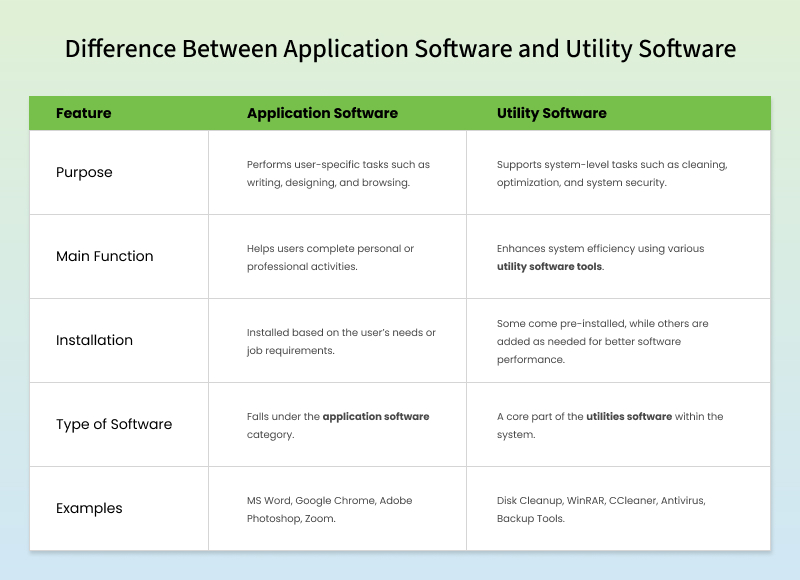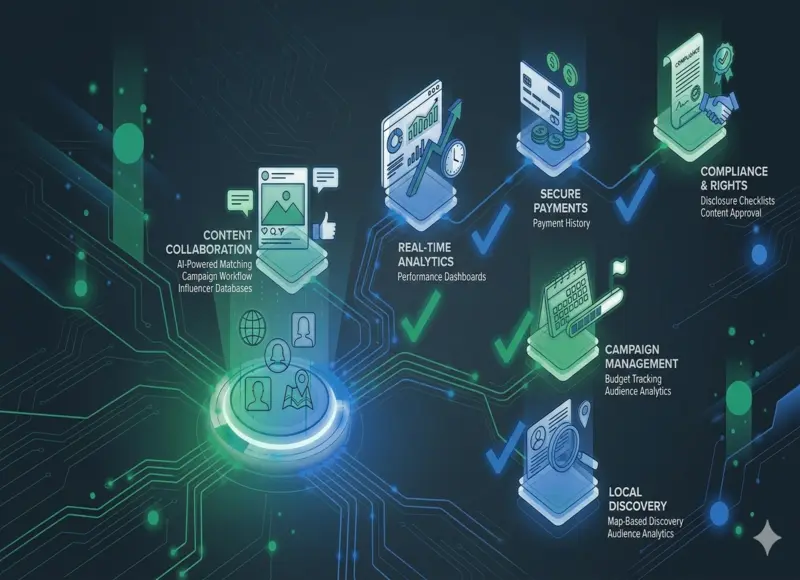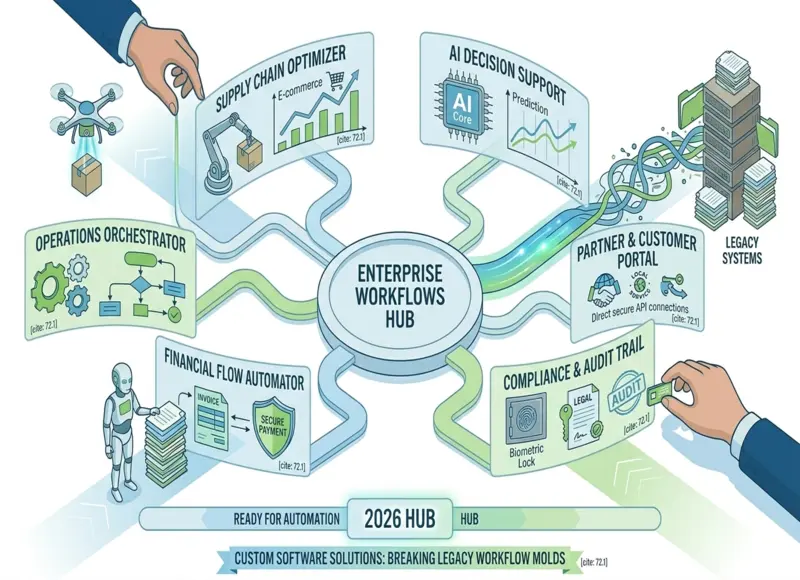What is Utility Software? 18 Perfect Examples of Utilities Software Tools
-
Last Updated:
21 May 2025
-
Read Time:
10 Min Read
-
Written By:
 Harshita Toplani
Harshita Toplani
-
16984
Table of Contents
Tired of finding your device slow or full of messy files and security problems? Utility software tools are the solution. Discover 18 powerful examples of utility software programs that keep your system clean, secure, and running at peak performance.

Is your device experiencing issues with cluttered files and security threats, or is it operating more slowly than usual? You're not by yourself. The need for intelligent tools to maintain the effectiveness of our systems is growing along with our dependence on technology. This is where utility software tools come into play. They are silent powerhouses working behind the scenes to optimize, protect, and maintain your device.
From antivirus and backup solutions to disk cleaners and file management tools, utility software is essential for ensuring suitable system performance. These tools don’t just enhance speed and improve organization. They also safeguard sensitive data, streamline everyday tasks, and help extend your device's lifespan.
The growing significance of these tools in every aspect of life is NOT NEGLECTABLE. In fact, according to Cognitive Market Research, the Utility Software market, valued at USD 4.94 billion in 2022, is projected to grow to USD 9.1 billion by 2030, registering a CAGR of 7.90% from 2023 to 2030.
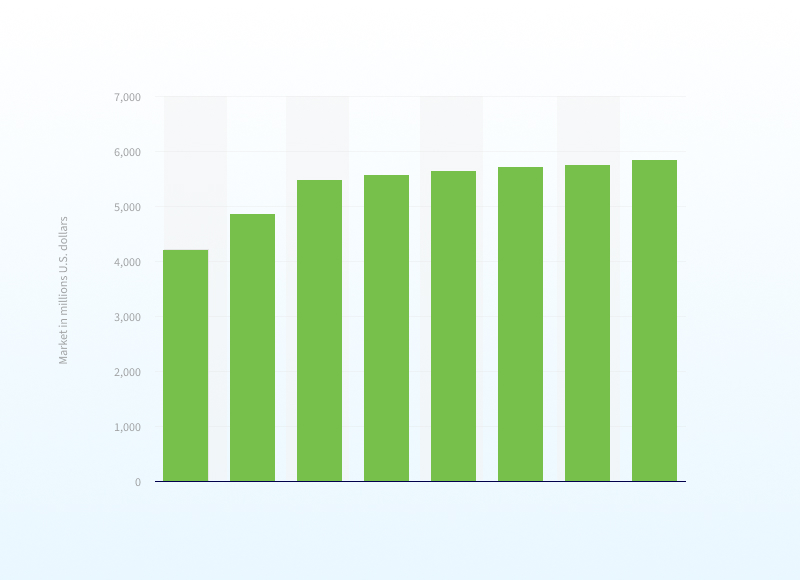
In this blog, we explore 18 top utility software tools and highlight real-world examples of utility software programs that can transform your digital experience. These utility software in computer also assist in boosting performance, enhancing security, and helping you get the most out of your device.
What is a good utility software?
Have you ever wondered why a simple restart doesn't always resolve your computer's slowness or hang? Restarting is not a long-term solution, even though it might provide a brief boost. You must comprehend the function of utility software programs if you want to genuinely enhance your computer's performance.
These tools are not just for system refreshes. They help to speed up your device, remove unneeded files, safeguard it from any dangers, and optimize the operating system. As a result, it's worthwhile to investigate what good utility software performs. It can improve your computer's performance over time rather than depending solely on temporary solutions.
How Utility Software Works
A good utility software is one that assists with setting up, checking, cleaning, and improving various aspects of your computer. It guarantees that your files, storage, and system speed all function properly.
Some tools assist in recovering deleted files, others address storage problems, and still others guard against viruses or improve file management.
Most computers come with basic utility tools built into the operating system. But you can also install other tools like antivirus programs or disk cleaners for better features and extra protection.
Utility software works with your computer's hardware, software, and storage. It keeps your system in good shape, so it performs well all the time.
Unlike apps made for users, utility software works in the background to keep your computer safe, fast, and organized.
In short, a good utility software is easy to use, reliable, and keeps your device running smoothly every day.
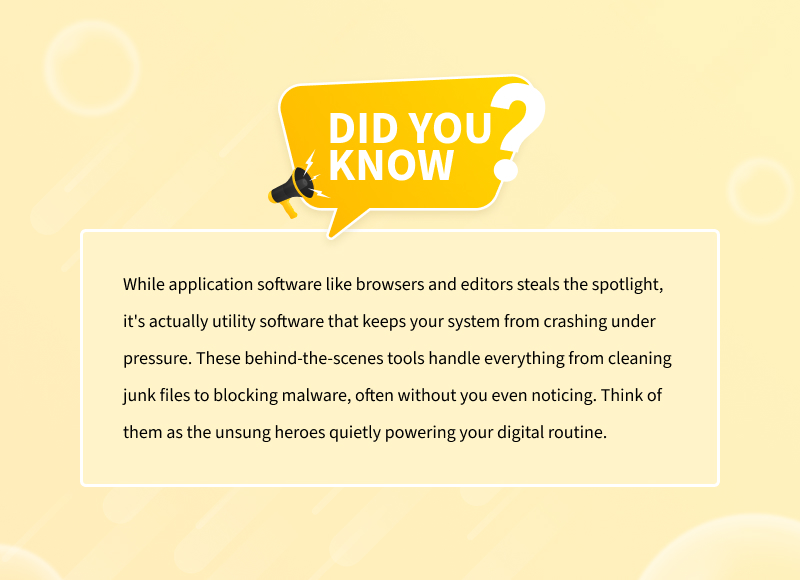
What is the purpose of Utilities Software Tools?
Utility software tools are silent assistants that maintain optimal computer performance. They do a lot of work behind the scenes, but they aren't particularly noticeable.
Their main purpose is to optimize performance, protect your system, and make daily tasks easier. Whether it's cleaning up junk files, scanning for threats, or organizing your data, these tools help everything run smoothly.
They also improve speed, security, and storage management. Many software development companies also use these tools to ensure system stability, especially during testing and deployment. Using the appropriate utility tools can significantly improve the way your computer feels and functions on a daily basis, because these are things you don't always consider until they go wrong.
What is the difference between application software and utility software?
Knowing the distinction between the application software & utilities software is important, as you wish to maintain your system efficiently & well-maintained.
While both are vital, utility software tools emphasize system health maintenance, whereas application software supports daily user activities.
You may select the appropriate mix of utility applications and programs for a smoother digital experience by knowing how each functions.
What are the Types of Utility Software Tools?
Utility software tools help your computer run better. They manage, protect, and maintain your system. These tools are not just extras. They are key to keeping everything working smoothly.
From file management to security, each tool has a purpose. Here are 5 of the most common types of utility software tools that keep your system in good shape.
1. Antivirus Software
Antivirus software is a must-have utility tool that protects your system from viruses and threats. It scans and deletes harmful files to keep your device safe. This type of utility software helps ensure smooth and secure performance.
2. File Management Tool
File management tools are a sort of computer utility software that allows you to easily organize, transfer, rename, and remove files. By enabling data finding and management, these utility software programs help to streamline operations and system performance.
3. Compression Tool
Compression tools are utility applications used to reduce the size of large files for easier storage and faster sharing. This utility software helps save disk space and supports efficient data management.
4. Disk Management Tool
Disk management tools are advanced utility software in computer systems that handle partitioning, formatting, and monitoring of disk drives. These utility software tools keep your storage organized and help prevent system errors related to disk usage.
5. Disk Cleanup Tool
Disk cleanup is a vital utility software that removes unnecessary files and clears the cache to boost performance. It’s one of the most commonly used utilities software programs for freeing up space and improving system speed.
6. Disk Defragmenter
A disk defragmenter is one sort of utility software tool that reorganizes fragmented data for improved performance and faster access in the computer. Through disk layout optimization, this utility application makes sure that the system reads and writes data more efficiently.
7. System Monitoring Tools
Track system health in real time—like CPU usage, RAM consumption, and disk performance. They are helpful for identifying performance issues and optimizing resources.
In addition to typical system-utilities like cleaners and disk monitors, there’s growing value in tools that boost workplace productivity rather than just system health.
For example, an AI presentation generator acts like a smart mini-utility for your content workflows: it takes raw slides, notes or draft material and quickly formats, styles and organises them into a cohesive presentation. This kind of tool frees up time from the repetitive task of slide design and lets users focus on storytelling, data-insights and communication - much like how a disk-cleaner frees up space and bandwidth in the system.
Key Benefits of Utility Software
Utility software may run quietly in the background, but its impact on your computer's performance is massive. Here are some standout benefits that make these tools essential:
- Utility software tools clean and optimize your system for better speed.
- Antivirus and firewall utilities protect your data from harmful threats.
- Organize, delete, or back up files using file management utilities.
- Compression and cleanup tools help free up valuable disk space.
- Recover deleted or lost files using data recovery utility tools.
- Utility applications offer layout and interface personalization features.
- Track CPU, memory, and processes with monitoring utility software.
- Schedule automatic scans, updates, and cleanups with utility software tools.
Top 18 Utilities Software Tools to Optimize and Enhance Your PC Performance.
1. CCleaner
Use for: System optimization, junk file removal, and privacy protection.
CCleaner is one of the most popular computer software utilities in the data cleaning category. This tool enhances the performance, secures user privacy & removes temporary files. It helps to keep your computer clean of cluttered files & operating quickly.
Key Features:
- Removes junk files, cache, and browser history.
- Speeds up startup by managing background programs.
- Offers real-time system monitoring and scheduled cleanups.
Pricing:
Free plan available. Premium version starts at $29.95/year.
2. Advanced SystemCare
Use for: PC optimization and real-time system protection.
Advanced SystemCare is a comprehensive utility program that helps protect privacy and improve PC performance.
- One-click cleanup of junk files and RAM optimization.
- Real-time protection from spyware and malware.
- Deep registry clean-up for smoother performance.
Pricing: Free basic version; Pro version starts at $19.99/year.
3. Norton
Use for: System tune-up and privacy safeguarding.
Norton Utilities provides deep system cleaning and speed-boosting tools tailored for individual user needs.
- Fixes common PC problems and boosts performance.
- Helps recover accidentally deleted files.
- Deletes browsing history & ensures privacy.
Pricing: An annual subscription costs $39.99.
4. Bitdefender
Use for: Antivirus protection and system optimization.
Bitdefender combines strong antivirus protection with utility features for keeping your system efficient and secure.
- Real-time threat detection and prevention.
- Optimizes speed and performance during heavy tasks.
- VPN and anti-tracker features included.
Pricing: Starts at $39.99/year for up to 5 devices.
5. System Mechanic
Use for: Automated PC maintenance and speed enhancement.
System Mechanic is a trusted utility software in computer performance optimization, offering smart fixes and real-time improvements.
- Boosts internet speed and system responsiveness.
- Removes bloatware and unnecessary programs.
- Real-time tune-ups to prevent slowdowns.
Pricing: Starts at $49.95/year.
6. Glary Utilities
Use for: System optimization and PC maintenance
Glary Utilities is an all-in-one utility software for computer systems. It boosts performance and fixes issues with one click. It’s simple to use and offers strong cleaning tools.
- One-click maintenance to fix registry and shortcut errors
- Disk cleaner to remove junk files and reclaim space
- Startup manager to speed up boot time
Pricing: Free basic version; Pro version starts at $19.97/year
7. Ashampoo WinOptimizer
Use for: Improving system responsiveness and maintaining Windows PCs
Ashampoo WinOptimizer is a robust utility program for computer systems that fine-tunes system settings, removes unnecessary files, and boosts overall performance with advanced tuning tools.
- Cleans web browsing traces for better privacy
- Customize Windows settings with ease
- Deep system scan to detect and fix errors
Pricing: Free trial available; Full version costs $29.99
8. Avast Ultimate
Use for: Comprehensive security and system performance
Avast Ultimate combines antivirus protection with system cleaning features, making it a strong example of a utility software package that secures and optimizes simultaneously.
- Advanced antivirus and anti-malware engine
- A cleanup tool to remove junk files and apps
- VPN for private and secure browsing
Pricing: Starts at $49.99/year for one device
9. WinRAR
Use for: File compression and extraction
WinRAR is a popular utility application for handling compressed files. It helps reduce file sizes and organizes large data easily.
- It supports multiple compression formats (RAR, ZIP, etc.).
- Encrypts archives with password protection
- Splits large archives into smaller files
Pricing: Free trial; Lifetime license costs $29
10. Defraggler
Use for: Disk defragmentation and file arrangement
Defraggler was created by the creators of CCleaner. It is a reliable tool for organizing fragmented files. This helps improve disk performance. It shows why utility software is important for keeping your system healthy.
- Defrags individual files or entire drives
- Schedules automatic defrags
- Visualizes disk fragmentation for easier monitoring
Pricing: Free basic version; Professional starts at $24.95
11. Fortect
Use for: PC repair and Windows optimization
Fortect is a utility software tool that helps repair Windows issues, replace damaged files, and ensure smooth system performance. It's designed for non-technical users looking for quick fixes.
- Automatically repairs system files and crashes.
- Replaces corrupted Windows files with healthy ones
- Scans and removes malware and harmful programs
Pricing: Starts at $33.95/year for 1 PC
12. Microsoft Drive Optimizer
Use for: Drive defragmentation and performance boost
Microsoft Drive Optimizer is a built-in tool in computers. It helps improve how files are stored and speeds up reading and writing on hard drives.
- Defragments and optimizes hard drives.
- Schedules automatic maintenance tasks
- Improves overall system response time
Pricing: Free (comes with Windows OS)
13. SharePoint
Use for: Document management and team collaboration
While not a traditional utility, SharePoint acts as a utility application in enterprise environments by enabling secure document sharing, workflow automation, and team productivity.
- Centralized document storage and access
- Custom workflow and form creation
- Real-time team collaboration and version control
Pricing: Starts at $5/user/month (Microsoft 365 Business Plan)
14. IObit
Use for: All-in-one system care and protection
IObit provides several utility software programs. One of its best tools is Advanced SystemCare. This makes it a top choice for total PC health.
- Real-time system monitoring and cleaning
- Privacy protection and ad removal
- Internet booster for better connectivity
Pricing: Free version; Pro version starts at $19.99/year
15. AVG TuneUp
Use for: Cleaning, speeding up, and updating PCs
AVG TuneUp is a utility software download worth considering for improving system speed, managing software updates, and cleaning up digital clutter.
- Cleans junk files and bloatware
- Updates outdated apps automatically
- Puts unused apps to sleep to free resources
Pricing: Starts at $49.99/year for 10 devices
16. Mini Tool Partition Wizard
Use for: Disk partition management and data recovery
MiniTool Partition Wizard is a powerful utility program in computer systems used for managing hard drive partitions, recovering lost data, and optimizing storage performance.
- Resize, move, and merge disk partitions.
- Recover deleted or lost partitions easily.
- Analyze disk space and fix file system errors
Pricing: Free basic version; Pro starts at $59/year
17. Disk Cleanup
Use for: Freeing up space and improving performance
Disk Cleanup is a tool in Windows. It helps remove temporary files, system caches, and unneeded data. This can improve system performance.
- Deletes outdated system files and logs
- Clears temporary internet files and caches
- Creates space for updates and new software
Pricing: Free (included with Windows)
18. Wise Care 365
Use for: PC cleaning, speed boosting, and privacy protection
Wise Care 365 is a well-known utility software. It combines performance tuning and privacy features. This makes it a complete maintenance tool.
- Cleans registry and junk files
- Enhances startup and shutdown speed
- Monitors hardware in real time
Pricing: Free version; Pro version starts at $29.95/year
Conclusion
Outdated processes and cluttered files could cause your computer's unusually slow performance. CCleaner, AVG TuneUp, and Norton are a few utility software programs that were previously mentioned.
These tools help to optimize and secure your system. Your PC would be faster & more effective, as these tools would be able to handle everything from file management to real-time protection.
Utility software is essential for everyday digital tasks. Yet, it is frequently overlooked. It helps increase the life of your system. It also protects data and boosts performance.
Using good utility software helps to maintain the best performance of your devices. It is beneficial to both whether you are individuals and those who have businesses.
FAQs About Utility Software Tools
1. What are 5 examples of utility software?
Here are five widely used utility software tools:
- CCleaner – for system cleanup and optimization
- WinRAR – for file compression and extraction
- Norton Utilities – for system performance and security
- Recuva – for recovering deleted files
- Avast Antivirus – for malware protection
Each tool has its own specific quality, which can help your system run smoothly.
2. Can you suggest some excellent examples of utility software?
Absolutely! Some excellent examples of utility software include:
- Advanced SystemCare for one-click optimization
- Glary Utilities for cleaning, repairing, and managing your PC
- Auslogics Disk Defrag assists in optimizing hard drive performance
These programs have a reputation for being dependable, effective, and simple to use.
3. How often should I use system utilities software?
It depends on your usage, but generally:
- Run a cleanup or optimization tool once a week.
- Use antivirus scans weekly or in real time.
- Perform disk defragmentation or backups once a month.
Using system utility software on a regular basis helps to maintain the data security, speed & efficiency of a PC.
4. How to Choose the Right Utility Software?
To choose the right utility software, look for trustworthy brands and read reviews. Make sure the tool and your operating system are compatible. Select tools with an intuitive user interface and automatic updates. Software development companies can also suggest tools for businesses looking for better performance and dependability.
Businesses can also opt for those tools that software development companies recommend to increase performance.
5. What is the difference between utility software and application software?
Utility software maintains and improves system performance in the background. In contrast, Application software handles tasks like writing or browsing. In short, Utility tools support the system; apps let you use it.
Recent Blogs
The Role of Artificial Intelligence in Modern Law Firm Growth Strategies
-
03 Mar 2026
-
6 Min
-
95
How Custom Software Companies Help Enterprises Automate Complex Workflows
-
03 Mar 2026
-
5 Min
-
105
